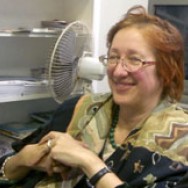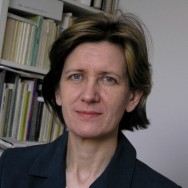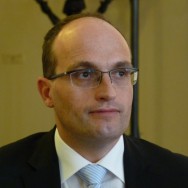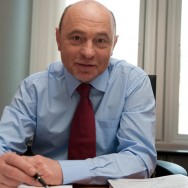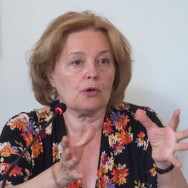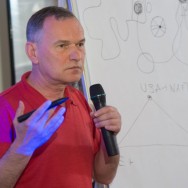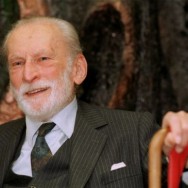Holds a doctorate in history from the University of Vienna. Since 1982 he’s served for the Foreign Service of the Republic Austria. 1986 – 1989 he worked for the Austrian Parliament and was the head of the Cabinet of the Austrian Minister of Science and Research. From 1990 to summer 1995 he was the Austrian Consul General in Krakow, Poland. From 1995 to 1999 Director of the Austrian Cultural Institute in London. Later on he was the head of the Department for Cultural Programming at the Austrian Ministry of Foreign Affairs, the Secretary General of the Austrian Research Association and a lecturer at the College of New Europe of the International Cultural Centre in Krakow.
Experts - culture
Milena Dragicević-Sesić
Rector of University of Arts, Belgrade, Professor at the Faculty of Drama. Chair of Art & Culture SubBoard, Open Society Institute (Soros fund), Budapest. Lecturer on the numerous courses: European Diploma in Cultural Project Management (Foundation Marcel Hicter, Bruxelles), ECUMEST, Dijon-Bucarest, Moscow School of Social and Economical Sciences, CEU Budapest, Lyon II, Jagellonian University in Krakow, etc. External examiner for the Master Programme "Art & Media Management in a European Context". Trainer-expert, consultant in cultural policy and management for European Cultural Foundation, Council of Europe, UNESCO, Foundation Marcel Hicter, G 17 +, British Council etc. Realized more then 50 projects in cultural policy and management. Published 12 books and more then 100 essays.
Jadwiga Hučková
Assistant Professor at the Institute of Audiovisual Arts of the Jagiellonian University of Krakow. Expert in the documentary film of Central Europe and Czech and Slovak cinema. Graduated from Jagiellonian University with degrees in history of art, filmology and journalism. Her PhD thesis (1995) analysed the Polish documentary in the 1980’s in its political, historical, literary and sociological context. Has published in a.o. Kino, Kwartalnik Filmowy, Studia Filmoznawcze, Universitas, Tygodnik Powszechny, Kultura Popularna, Kinowedczeskije zapiski. Has published (under the name Jadwiga Głowa) books: “Zooming in on History’s Turning Points. Documentaries in the 1990s in central and Eastern Europe. Papers from an international seminar held on May 29, 1999. Jagiellonian University Cracow”, „Dokument filmowy epoki Havla” (“Film Documentary in Times of Havel”), which examines Czech documentaries made after 1989 during the time of intensive political and economical changes. Member of the Programme Council and the Selection Committee of Krakow Film Festival (former International Short Film Festival). Member of the juries at the international film festivals in Denmark, The Czech Republic, Slovakia, Poland, Germany, Finland, Sweden, Yugoslavia, Iran, Israel, Italy. Has organized the international film festival “Human dignity, Tolerance and the Holocaust as seen through the medium of the documentary film” (Swedish International Culture Forum, Stockholm 1999). Head of Program and the coordinator of the festivals about human dignity and tolerance in Stockholm (2001, 2003). Has take a part in the international project Visegrad Documentary Film Library - Prague 2002/2003. An expert at the Polish Film Institute.
Wojciech Przybylski
Wojciech Przybylski leads the largest strategic foresight program on European policies in Central Europe. He is the editor of Visegrad Insight at the Res Publica Foundation in Warsaw. Previously, he served as the editor-in-chief of Res Publica Nowa and later of EUROZINE, a pan-European network of cultural magazines. He is a guest lecturer for the Foreign Service Institute for the U.S. Government, the Central European University Democracy Institute, and the Pázmány Catholic University in Budapest. He is a graduate of MISH at the University of Warsaw, a Europe’s Future Fellow at the Institute for Human Sciences (IWM) in Vienna, and a member of the advisory board for LSE IDEAS Ratiu Forum, the European Forum for New Ideas, and the Schmidt Futures International Strategy Forum. He has published works including "Understanding Central Europe" (Routledge 2017) and "On the Edge. Poland" (Culturescapes 2019). Twitter: @wprzybylski
Jan Sechter
Current Ambassador of the Czech Republic to Poland. Mr. Sechter graduated in 1992 from Faculty of Economics, at the University of Agriculture, Prague. Founder of „Lidové noviny” newspaper. In the nineties he worked in the Department for Culture and Czechs Abroad (Ministry of Foreign Affairs), in 2000 was a head of unit cross-sectional agenda, department of Central Europe Countries, MFA. In the years 2000/2001 – 2007 he was a member of many institutions: Board of Czech-German Future Fund, Directors Board of Fund for victims of Holocaust etc. In 2007-2008 was on duty in Executive Secretary of the Task Force for International Cooperation on Holocaust Education, Remembrance and Research.
Bogusław Sonik
Since 2005 Member of the Lower house of the Parliament of Poland. From 2004 till 2014 Member of the European Parliament, chairman of Stowarzyszenie Maj77 and Villa Decius Association. Former director of the Polish Institute in Paris and minister plenipotentiary at the embassy of the Republic of Poland in France (1990–1996) and director of “Kraków 2000 – European City of Culture” Festival (1996–2002). Director of the Department of Promotion at the Krakow Municipal Office (2003–2004). Awarded the Chevalier de l’Ordre des Arts et des Lettres (1993) and the Order of Merit for achievements in the field of Polish Culture (1999). In the European Parliament, he was a member of the Foreign Affairs Committee, the Subcommittee on Human Rights, the Committee on Environment, Public Health and Food Safety, and responsible for negotiations on the REACH directive. His most significant success was the report concerning the influence of extraction of shale gas on environment which gave the “green light” to the extraction of shale gas in Europe.
Laszlo Szemelyi
Sociologist, honoured with Pro Scientia Golden Medal in 2007 for his analyses on brain drain from Hungary. Interested in problems related to migration, organizations and culture. Mr. Szemelyi also worked in analyst, project manager and CRM roles in the financial and media sector.
Magdaléna Vašáryová
A member of the National Council of the Slovak Republic. Chairwoman of the oldest Slovak women’s association „Živena“ and chairwoman of the Institute for cultural policies. In the past she served as a State Secretary in the Ministry of Foreign Affairs of the Slovak Republic. Ambassador of the Slovak Republic to Poland (2000 – 2005), between 1990 – 1993 Czechoslovak Ambassador to Austria. Founder and in years 1993 – 2000 the director of the Slovak Foreign Policy Association - SFPA (today honorary chair). Lectured at the Institute of International Relationships and Law Harmonization at the Faculty of Law of the Comenius University in Bratislava, and currently she is lecturer at the CEVRO Institute (Prague). In 2010 she was awarded with a Gold Medal for Meritorious for Culture – Gloria Artis. An author of several books and articles in domestic and international press.
Taras Voznyak
Ukrainian culture expert, political scientist, editor-in-chief and founder of Independent Cultural Journal "Ї".Studied at the Lviv Polytechnic National University. After Gorbachev’s thaw he became an activist of democratic movement and coorganised the first general strike in Ukraine (at Lviv Factory of Milling Machines). Associated with an informal group of intellectuals “Lvivska Shkola” (Lviv School). He translated a large number of texts and published within samizdat. He isthe editor-in-chief and publisherof theIndependent Cultural Journal "Ї", which has transformed into an influential NGO and a think tank covering issues of civil society, human rights, interethnic relations, cross-border cooperation, multiculturalism, European integration, regionalism, globalisation and anti-globalist movements, ecumenical dialogue, political changes in the region. Initiator and organiser of community campaigns on the promotion of cultural heritage of Halychyna. Co-initiator of an honorary distinction "Order for Intellectual Bravery". Author of more than 400 publications in Ukrainian and foreign media. Awarded with an honorary distinction "Knight of Halychyna" in the nomination "Public Figure" (2001), a distinction “20 Years of the First Democratic Convocation of Lviv Regional Council” (2010), a distinction by Lviv Mayor “Saint George Distinction of Honour” (2011).
Jacek Woźniakowski
Professor of history of art. Uniwersytet Jagielloński and Katolicki Uniwersytet Lubelski. He also was the chairman of the board of Villa Decius Association, now its Honorary President. He cooperated with Tygodnik Powszechny, was chief editor of Znak and chief editor of publishing house Znak. 1989 he took part in the Round Table negotiations. 1990-1991 he was mayor of the of city Kraków. Author of dozens of books: "Zapiski kanadyjskie", "Góry niewzruszone" and articles, interpreter of Bennett and Greene. For special merits for France in field of culture awarded with Croix de la Légion d'Honneur.


